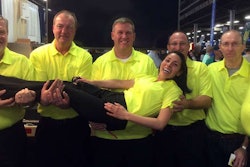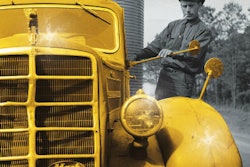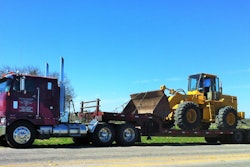“I feel like it is inevitable that it is going to happen just because that’s the way of the industry. … To me it only makes sense to have both. If you’re in a court of law and they’ve got your forward-facing camera, and there’s no doubt you maintained your lane, the next question out of the lawyer’s mouth is going to be, ‘What is that driver doing? Why can’t we see what that driver’s doing?'” –Wal-Mart driver Gary Mars to the Northwest Arkansas Democrat Gazette, about dual road- and in-cab-facing cameras‘ utility as protection tools in today’s litigious environment.
The quote above from Mars comes with reporting from the Arkansas newspaper about Wal-Mart’s move to outfit drivers based out of several locations with various camera systems as the fleet tests their use. The systems include, variously, those triggered to record by road events and the more intrusive continuous-recording variety that have been popping up more and more.
The private fleet’s reached beyond the select terminals it’s outfitting by looking for volunteers to adopt the systems fleetwide, the Gazette reported, with Mars being one such driver. Find the full report via this link.
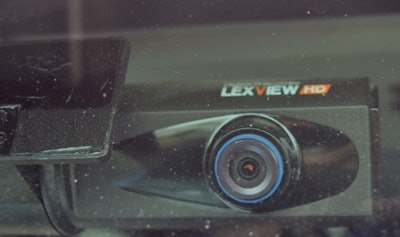 The forward-facing camera, mounted just left of center at the top of the windshield, in independent Howard Salmon’s 1999 KW.
The forward-facing camera, mounted just left of center at the top of the windshield, in independent Howard Salmon’s 1999 KW.Speaking of cameras: Nolo contendere for Howard Salmon in following-too-close case
Rest assured, however, that Salmon wasn’t pleading ‘no contest’ to following too close, the charge that was brought by the officer on the scene of his well-publicized and minor run-in with a Toyota Prius on I-24 SB just inside the Georgia line.
By the time he got to the North Georgia jurisdiction for his scheduled bench trial this morning, the prosecutor had seen his dashcam video of the incident and offered a reduction in charge from the safety-serious following too close, which would have come with four points on his license. By about 9:30 a.m. local time Salmon was on his way with no points on his license, the no contest (and thus no admission of guilt) plea to driving “too fast for conditions” and $50 lighter.
“Just a money grab,” in the end, he says, though he felt it was something of a win-win — saved him a lost day, in the end, as going through to trial would have kept him around the court the better part of the day. Saved him, too, the uncertainty with how things might have turned out in a trial, always a question mark, particularly for owner-operators representing themselves in local courts, I’ve found in recent conversations. Stay tuned for a longer story on this subject later in the month and in the January magazine.
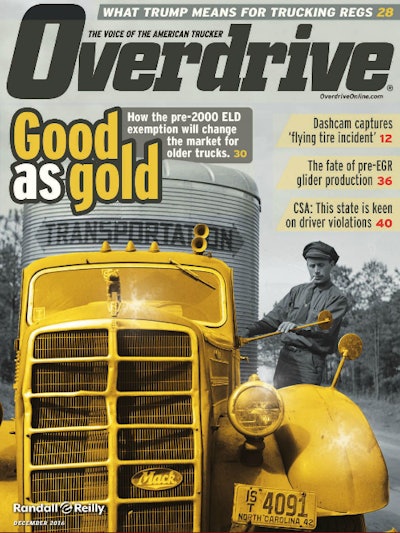 Read the December cover feature story on the ELD mandate and its pre-2000 model year truck exemption via this link.
Read the December cover feature story on the ELD mandate and its pre-2000 model year truck exemption via this link.Inevitable ELDs/e-logs for owners of pre-2000 trucks?
A lot of discussion under the story from early this week that posed this question, not a lot of it directly related to the question. Nonetheless, as noted in the story, there are two schools of opinion. One comes from those who deal with brokers/shippers on the ground daily (that’s you), the other from prognosticators who believe that once the ELD mandate is in place, a sizable number of shippers will demand their freight move on trucks recording hours electronically, thus forcing owners of pre-2000, ELD-exempt trucks into some kind of electronic hours solution beyond just a logbook app or laptop program.
Count Western States Trucking Association representative (and former owner-operator) Joe Rajkovacz among the former camp. “If I had a dime for every time I’ve heard or read someone say that ‘the supply chain is mandating ELDs,’ I could probably retire” a well-off man, he says, noting those who suggest that are often “full-blown proponents of ELDs” in his experience.
I don’t think that applies to Jonathan Starks of FTR Transportation Intelligence, quoted to that effect in the story, but I’ve heard similar from others, some of them representatives of ELD providers.
I’ll concur with Rajkovacz for sure on this point: “The fact is: I’ve not heard a single complaint from any owner-operator or small-fleet that they have been coerced into using ELDs by the supply chain,” i.e. demands from shippers, receivers, brokers and the like.
While he’s quick to note he’s “not a lawyer,” Rajkovacz suggests legal liability would extend even further into a shipper’s business if said shipper suddenly decided to “involve themselves in the hours of service of the motor carriers with whom they are doing business.” While it does already happen that “shippers get dragged into a legal mess after a crash, imagine a world where they make this type of demand and then look the other way (which they all will) — good luck!”
What’s next, contract-required speed-limiting devices on trucks shippers do business with? They have bigger fish to fry, Rajkovacz says, and the rude awakening will be theirs provided the ELD mandate goes through. “Most of the supply chain still has not come to terms with the impending slow-down in freight movement because of policies like this, and they still think they can detain a truck for unreasonable amounts of time. They are the ones who are going to face a rude awakening – not the other way around.”


